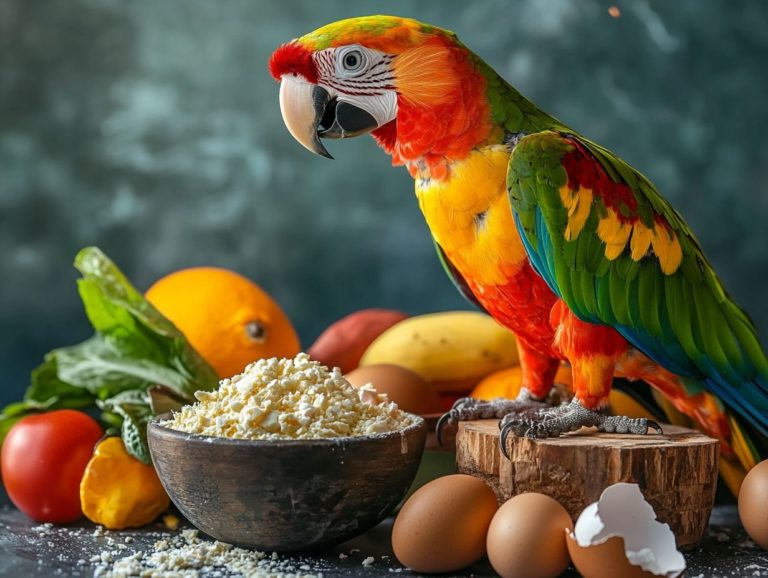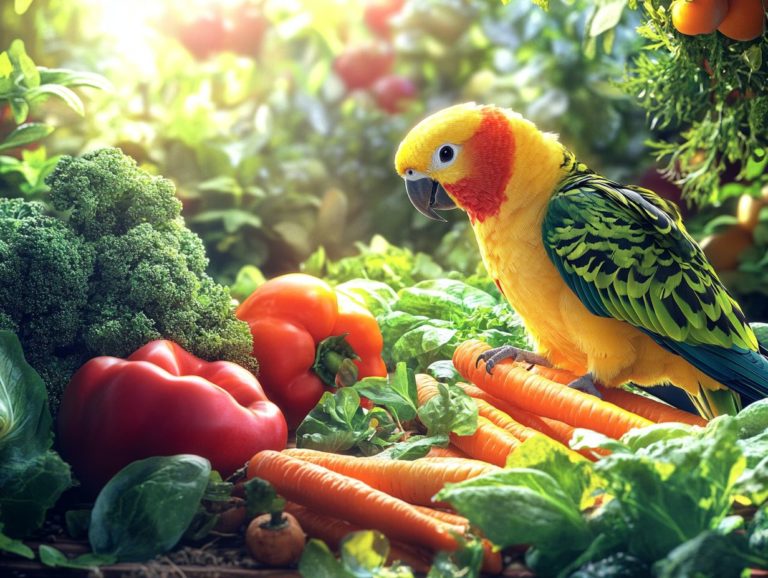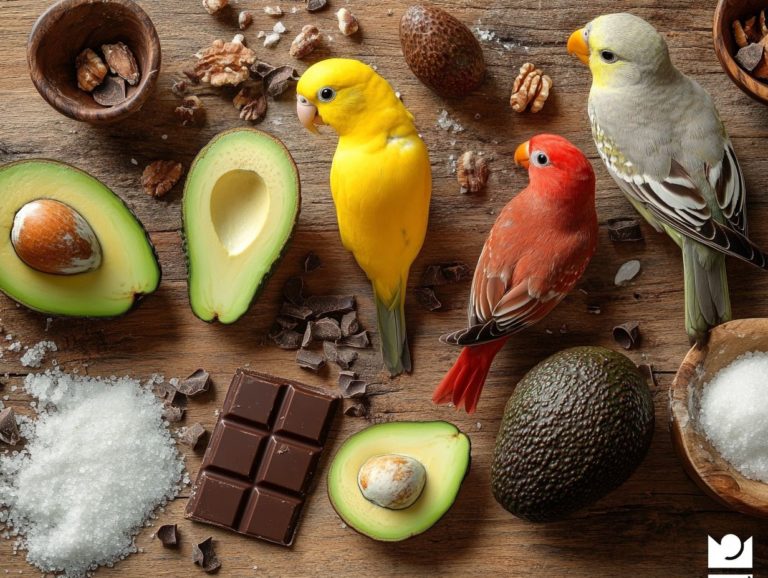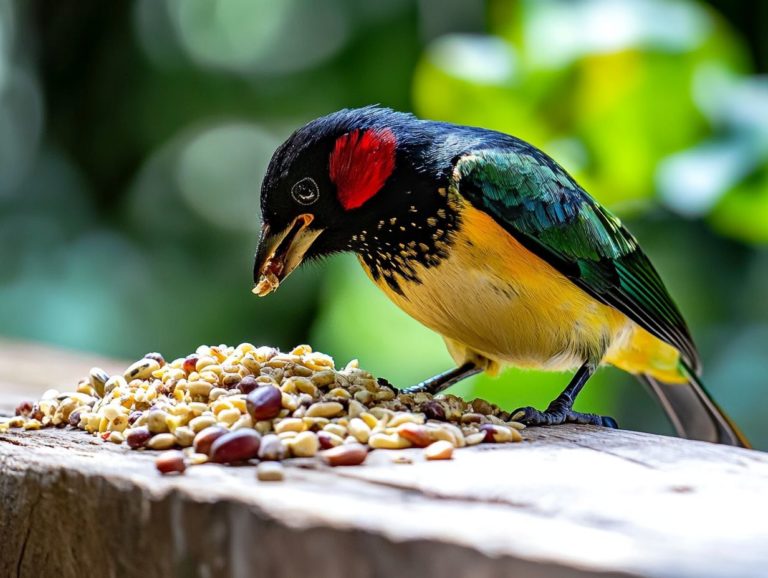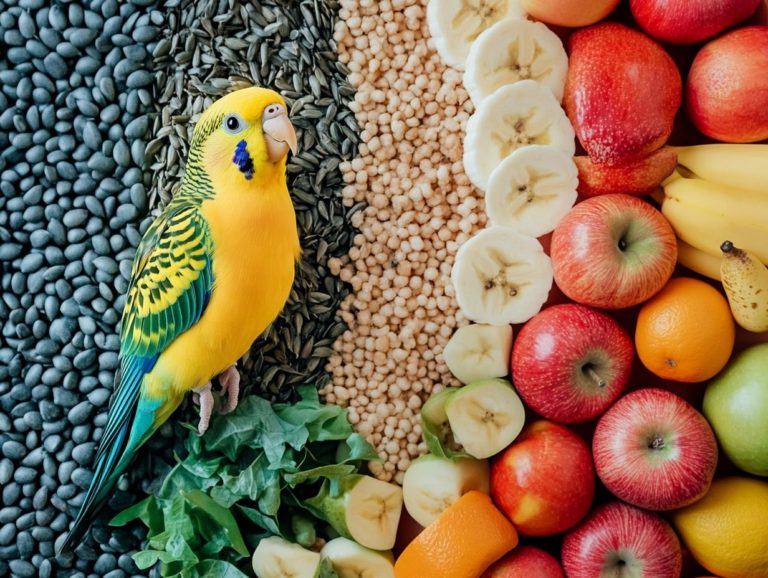The Best Herbs for Pet Birds
Ready to improve your pet bird’s health? Adding herbs to their diet can be an amazing choice!
Herbs can boost their immune systems and provide calming effects, offering a range of benefits tailored specifically for your feathered companions.
This guide delves into the best herbs you can introduce to your birds, discusses their potential health benefits, and highlights essential precautions for safe usage.
Whether you’re seeking natural remedies for specific health issues or simply looking to enrich your bird’s diet, this guide is filled with valuable insights for you.
Contents
Key Takeaways:
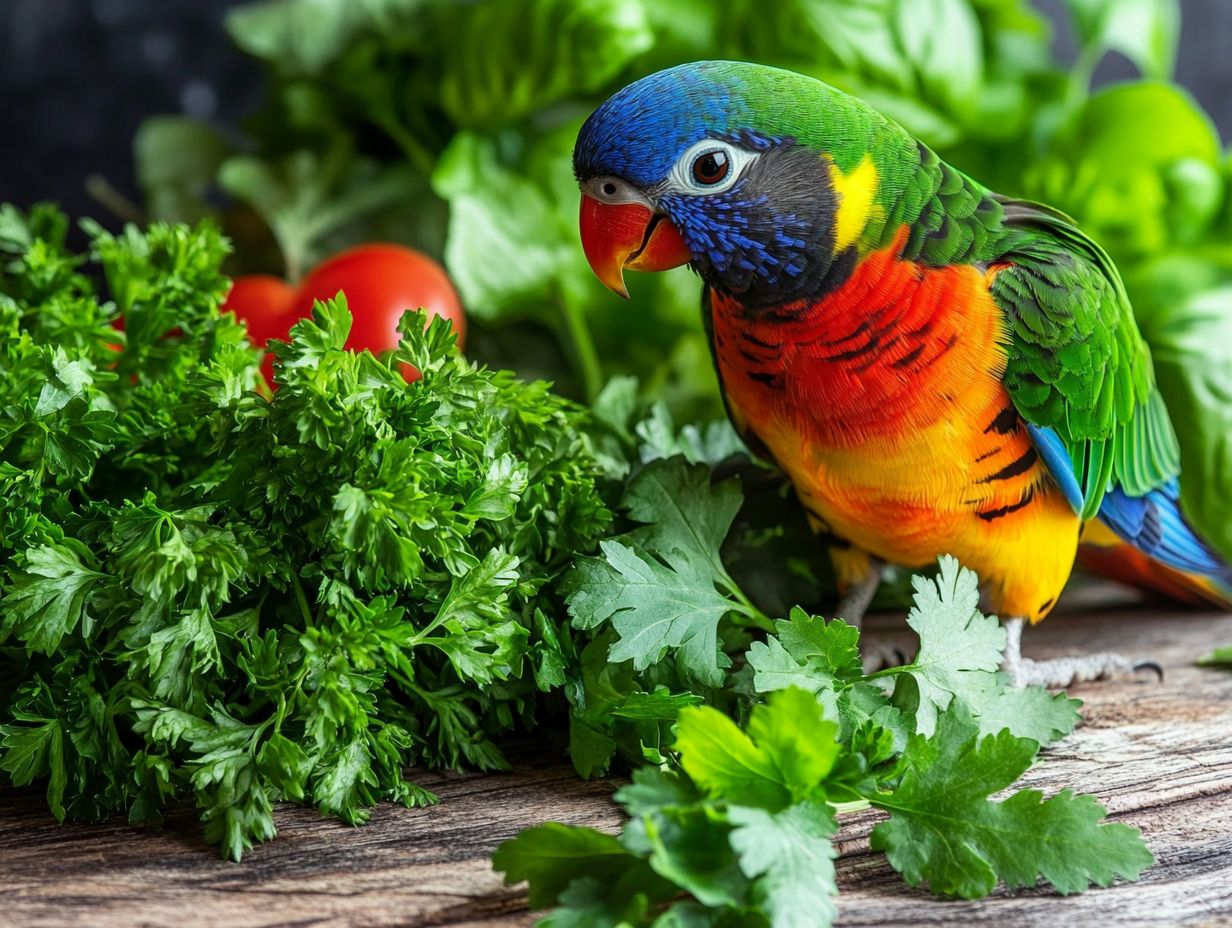
- Dandelion is a great herb for improving digestion and liver function in pet birds.
- Chamomile can help reduce stress and anxiety in pet birds, promoting relaxation and better sleep.
- Milk Thistle is useful for detoxifying a pet bird’s liver and supporting overall liver health.
1. Dandelion
Dandelion, often overlooked, is a nutritional powerhouse for your pet birds, offering essential vitamins and minerals which significantly enhances their health and well-being. This herb is incredibly easy to grow right on your window sill and provides a range of health benefits that can enrich the daily routine of bird owners seeking to diversify their feathered friends’ diets. Both the leaves and flowers are safe to introduce into their meals, promoting a healthy diet and supporting their immune system.
Rich in vitamins A, C, and K, dandelion is packed with antioxidants. It aids in detoxification.
The leaves are especially high in calcium and iron. These are crucial for bone health and blood function. Preparing dandelion for your birds is a breeze just rinse the leaves thoroughly to remove any pesticides or contaminants, and serve them fresh.
Your birds might enjoy them in salads or mixed with other greens. Just remember to introduce this herb gradually and avoid overfeeding, as too much can lead to digestive upset. Always ensure that the dandelion you use is sourced from a safe, chemical-free environment.
2. Chamomile
Chamomile is a soothing herb renowned for its calming properties, making it an exceptional addition to your pet birds’ diet to promote relaxation and overall health. You can easily introduce fresh or dried chamomile into their meals, allowing them to enjoy the gentle benefits of this delightful herb.
Incorporating chamomile into their diet can effectively alleviate stress and anxiety in birds, particularly during noisy events or when they find themselves in unfamiliar surroundings. You can also brew a mild chamomile tea, cool it down, and offer it to your feathered friends, or sprinkle dried chamomile flowers over their food.
Always ensure that any chamomile you use is free from pesticides or contaminants. Remember, moderation is essential, so it’s wise to introduce this herbal remedy gradually and monitor how your birds respond.
3. Milk Thistle
Milk thistle is celebrated for its remarkable health benefits, particularly in supporting liver health for your pet birds. For those committed to natural methods for bird care, this herb becomes essential. By incorporating milk thistle seeds or extract into your bird’s diet, you can introduce vital nutrients that enrich their daily routine with a healthy infusion of antioxidants.
These antioxidants are crucial for combating harm caused by harmful substances in the body, promoting overall wellness and vitality for your feathered companions. By aiding in liver detoxification, milk thistle enhances the organ s capacity to process harmful substances, ultimately reducing the risk of liver-related diseases.
Consult with an avian veterinarian before adding this herb to your bird’s diet. They can provide tailored recommendations on appropriate dosages and forms. Typically, powdered milk thistle can be seamlessly mixed with their regular feed or offered in capsule form, ensuring your pet birds enjoy the benefits without any adverse effects.
4. Echinacea
Echinacea is widely celebrated for its immune-boosting properties, making it an excellent herbal treatment for your pet birds. This powerful herb can supercharge your birds’ immune systems! It s easy to grow at home, offering a natural way to enrich your birds’ diet with new nutritional foods.
By incorporating echinacea into their daily meals, you can provide a supplement that strengthens your feathered friends’ defenses and supports their overall wellness. Its benefits extend to enhancing respiratory health as well.
It’s important to take some precautions. Introduce echinacea gradually and watch for any adverse reactions, especially if your birds have pre-existing health conditions. Consulting with an avian veterinarian before making significant dietary changes is always a wise step.
5. Garlic
Garlic, often the subject of lively debate among pet enthusiasts, possesses notable antibacterial properties that can benefit your pet birds when introduced with care. If you’re looking to enrich your birds’ diets with nutritious options, consider the potential health advantages of incorporating garlic thoughtfully into their meals.
This powerful herb strengthens their immune systems! With its antifungal and antiparasitic properties, garlic further supports the overall well-being of your feathered friends.
However, it’s essential to tread carefully; consuming excessive garlic can lead to toxicity in birds, showing up as lethargy or digestive troubles. Striking the right balance is vital. By consulting with your veterinarian and closely observing your pet’s reactions, you can easily provide this natural supplement while ensuring your birds remain vibrant and thriving.
6. Ginger
Ginger is a remarkably versatile herb celebrated for its medicinal properties, making it an excellent addition to your pet birds’ diets to combat inflammation and bolster their overall health. You can effortlessly introduce fresh or dried ginger into their meals, providing a flavorful boost to their nutritional intake.
Incorporating ginger can significantly enhance digestion and alleviate gastrointestinal discomfort, proving particularly beneficial during molting or stressful times. As a bird enthusiast, you can prepare ginger by grating it fresh or brewing a tea to drizzle over their food.
It s wise to monitor your bird s reaction, starting with a dosage of around 1/16 teaspoon for smaller birds, and only increasing if there are no adverse effects. This approach allows your feathered friends to reap both the health benefits and the delightful taste that ginger provides.
7. Lavender
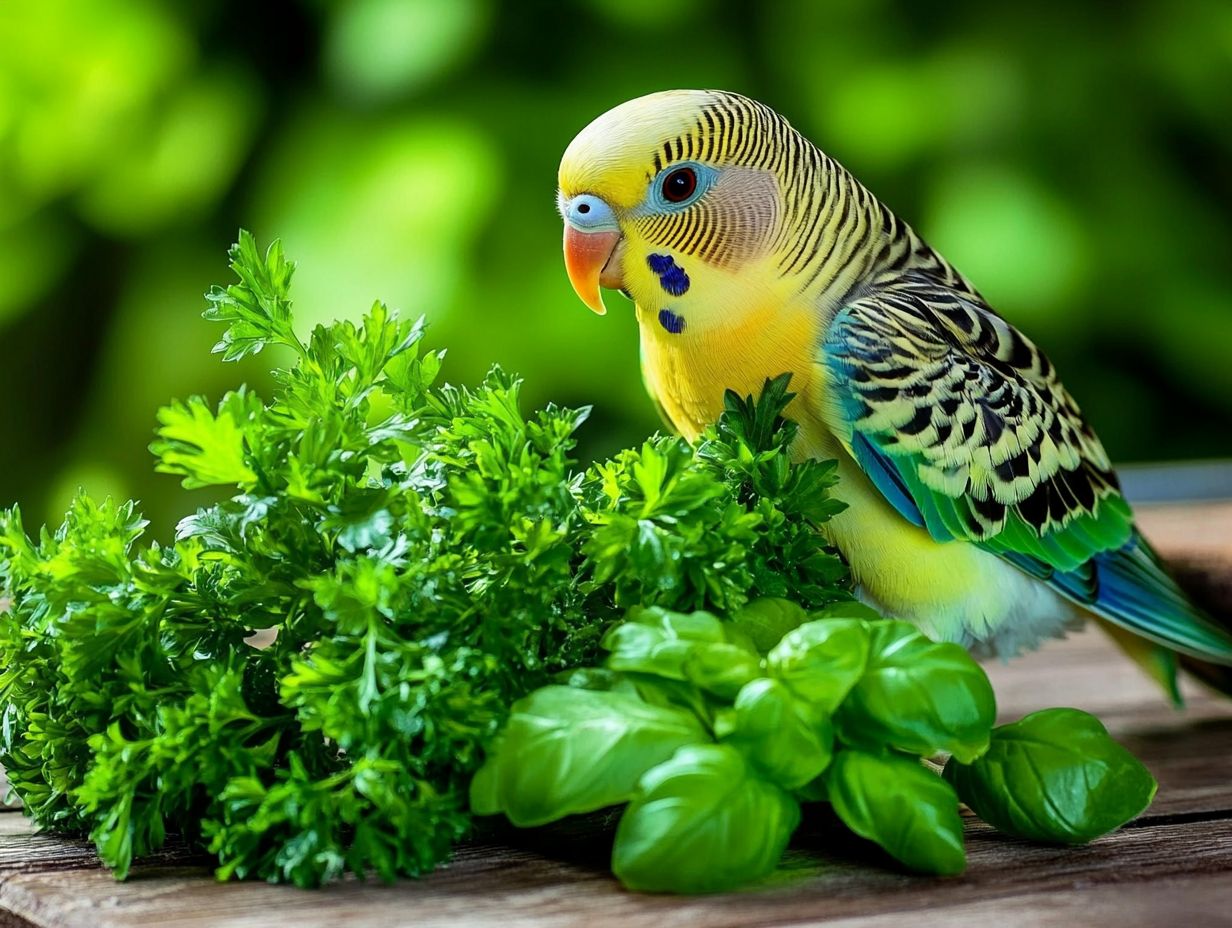
Lavender is treasured not only for its enchanting aroma but also for its soothing effects, making it a remarkable herb for pet birds, particularly those prone to anxiety or stress. By introducing lavender as an herbal treatment, you can significantly enhance your feathered friends’ well-being and create a calm and soothing home for them.
To prepare lavender for your avian companions, begin by drying the flowers, ensuring they are free from any pesticides and chemicals. Once dried, gently crush the flowers to release their essential oils, which you can sprinkle in your bird’s cage or mix into their favorite seed or pellet blend.
You might also consider brewing a mild lavender tea and allowing it to cool before serving it as a refreshing drink. Incorporating this calming herb not only helps alleviate stress but also adds delightful variety to their diet, promoting both mental and physical wellness while fostering a serene atmosphere in their living space.
8. Lemon Balm
Lemon balm is a delightful herb that brings a refreshing touch and calming effects. It s a superb choice for bird owners aiming to ease stress and anxiety in their feathered friends. Adding lemon balm to your bird’s diet can be simple and effective, enriching their meals with a burst of flavor and herbal benefits.
To prepare this soothing herb for your companions, brew a mild tea by steeping fresh or dried lemon balm leaves in hot water. Once cooled, you can offer this infusion as a drink or mix it into their favorite soft foods. The aroma of lemon-scented leaves creates a calming atmosphere, soothing stress-prone species during times of change or loud noises.
Incorporating this herb not only enhances their well-being but also supports digestion. It provides a refreshing treat that can invigorate their spirits, proving advantageous for their overall health.
9. Oregano
Oregano is not merely a culinary delight; it also has remarkable antibacterial properties that can enhance your bird’s health. This makes it a fantastic addition to any pet bird’s diet. You can easily incorporate fresh or dried oregano into your bird’s meals, enriching their nutritional variety.
This versatile herb can be sprinkled over seed mixes or blended into bird-safe recipes. It adds a flavorful twist that promotes overall well-being. Oregano is packed with antioxidants and substances that reduce inflammation, helping to bolster your bird’s immune system.
However, it s crucial to use oregano in moderation. Excessive amounts might lead to digestive issues in some species. Always consult with a veterinarian before making significant dietary changes, ensuring that the introduction of this herb supports your bird’s health without adverse effects.
10. Parsley
Parsley is a vibrant herb, brimming with essential vitamins and minerals. It’s a splendid addition to your pet birds’ diets. By incorporating parsley in moderation, you can enrich their meals while promoting overall avian health.
Packed with vitamins A, C, and K, along with vital trace minerals like iron and calcium, parsley provides numerous health benefits, including improved immune function and enhanced bone health.
To seamlessly incorporate parsley into your bird’s diet, chop the leaves finely and mix them into their regular seed or pellet food, or offer it fresh as a delightful treat. Be sure to monitor their intake, as too much parsley could lead to digestive upset.
It s crucial to wash parsley thoroughly, just like any other herb, to eliminate pesticides or contaminants. This ensures your feathered friends can enjoy this nutritious addition safely. Don t wait! Add these herbs to your bird s diet today and watch their health thrive!
11. Rosemary
Your birds will love the taste of rosemary! This aromatic herb is great for their health.
Rosemary has properties that help protect against damage. It offers several nutritional benefits that can boost their overall well-being.
Incorporating rosemary into their meals aids digestion and supports respiratory health. It can also enhance mental clarity thanks to its stimulating compounds.
Simply chop fresh leaves finely and mix them into their feed, or brew a light infusion. Remember to keep the flavor mild!
Watch for any allergic reactions or digestive issues. Introducing rosemary gradually is important to assess tolerance while enjoying its health benefits.
12. Sage
Sage is a versatile herb that offers many health benefits for your birds. It can help support their respiratory health while adding flavor to their diet.
This herb is not only tasty but also provides a valuable source of antioxidants and anti-inflammatory properties. It helps keep your feathered friends vibrant and active.
You can serve sage as fresh leaves, dried crumbles, or even infused teas. Just remember to offer it in moderation!
Plan the dosage carefully; typically, a small pinch or a single fresh leaf per day is perfect. This ensures your pets enjoy all the benefits without overwhelming their systems.
13. Thyme
Thyme is an exceptional herb known for its antibacterial properties. It’s a valuable asset in promoting the health of your pet birds and helping to combat infections. As a bird owner, you can easily grow thyme at home and add it to your feathered friends’ meals to enrich their diets with essential nutrients.
This aromatic herb is packed with vitamins A, C, and K, along with crucial minerals like iron and manganese. All of these contribute to your birds’ overall well-being. Here are some easy ways to add thyme to their meals:
- Sprinkle fresh or dried thyme over your pets’ favorite fruits.
- Mix it into their soft foods.
Before serving, be sure to wash any herbs to remove pesticides or chemicals for safety. Start slow when adding new foods, so your birds can adjust well! While thyme is generally safe for birds, it’s important to introduce it gradually to monitor for any potential allergic reactions or digestive issues.
By thoughtfully incorporating thyme into their diets, you can boost your birds’ nutrition, helping them stay vibrant and healthy.
14. Turmeric
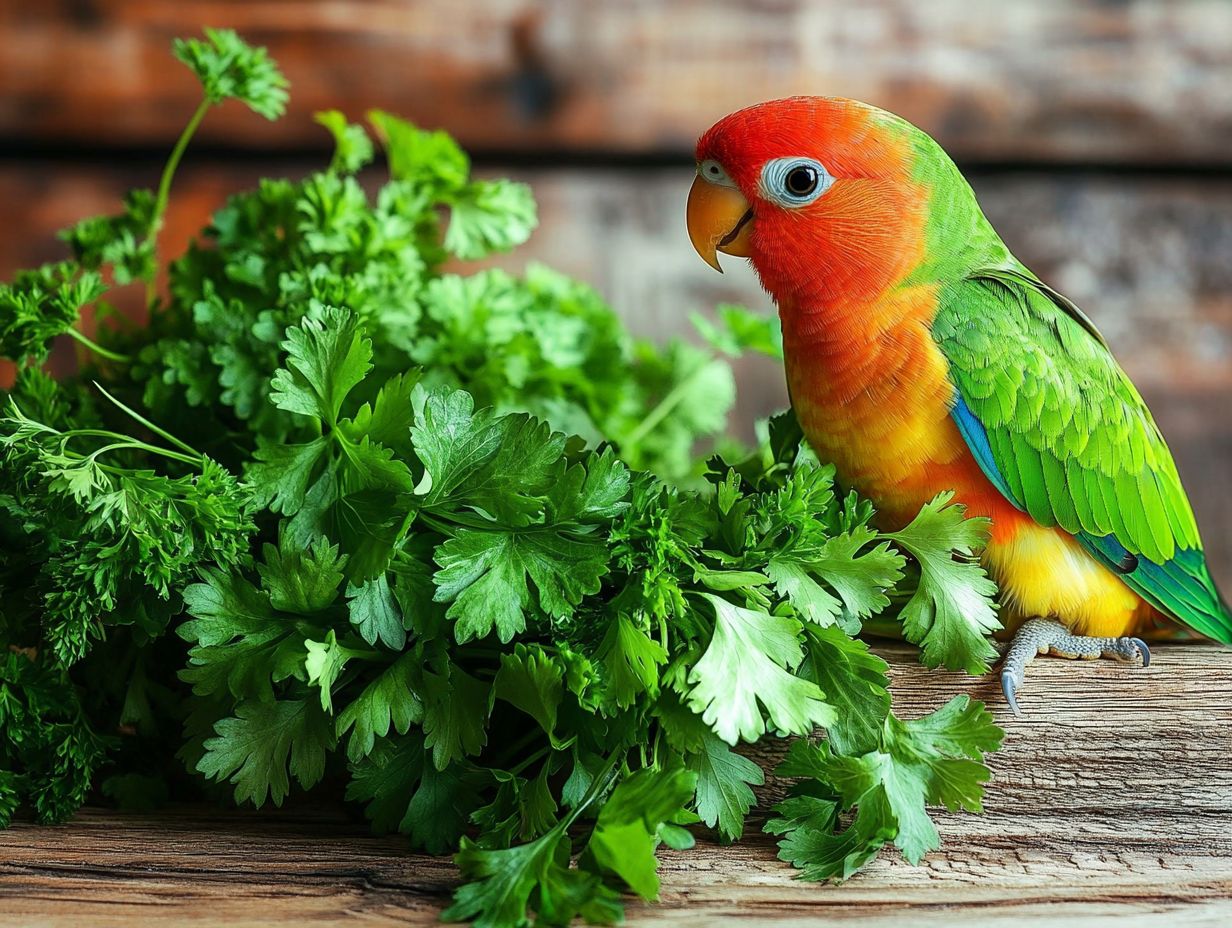
Turmeric is a remarkable herb known for its powerful medicinal properties. It helps to reduce swelling in pet birds and is an impactful way to enhance their overall health.
This herbal marvel not only supports the immune system but also aids digestion, making it a versatile addition to avian nutrition. You can easily sprinkle turmeric onto fresh fruits or mix it into soft foods, especially for birds that might be hesitant to try new flavors.
However, remember that moderation is key. Using too much turmeric can upset a bird’s delicate digestive balance. By understanding the right amounts and preparation methods, you can ensure your birds enjoy the benefits of this vibrant spice while keeping them in tip-top shape.
Try these herbs for your birds and watch their health improve!
15. Valerian
Valerian is a remarkable herb renowned for its calming effects. It serves as an ideal remedy for stress in pet birds, particularly in noisy or hectic environments. As a bird owner, you can easily incorporate valerian into your feathered friends’ diets to foster relaxation and enhance their overall well-being. This is especially beneficial for birds that are sensitive to environmental stressors.
You have the option to administer this herb in various forms, such as dried leaves, liquid extracts (known as tinctures), or teas. Many avian specialists endorse valerian’s soothing properties to help reduce anxiety and promote restful behavior, especially in young or easily disturbed birds that might be more vulnerable to stressors.
It’s important to monitor your birds for any signs of side effects, which could include drowsiness or, in rare cases, digestive upset. This vigilance ensures that the benefits of valerian far outweigh any potential adverse reactions.
What Are the Benefits of Using Herbs for Pet Birds?
Introducing herbs into your pet bird’s diet can open up a world of benefits, enhancing nutritional intake while also providing natural medicinal effects that promote overall health. By adding safe herbs, you can bring exciting flavors and nutrients to your feathered friend’s daily routine, ultimately leading to a happier and healthier companion.
Herbs like parsley, basil, and dandelion are not just delightful for your bird’s taste buds; they also boast an impressive array of vitamins and minerals. For example, parsley is loaded with vitamins A, C, and K, while dandelion serves up essential antioxidants that can strengthen the immune system.
Using herbs can spark natural foraging behaviors, encouraging both physical activity and mental engagement. A diverse diet enriched with various herbs ensures that your bird receives a comprehensive range of nutrients, which is crucial for its vitality. Ultimately, offering a variety of herbs not only nourishes your pet but also enriches the bond you share through these delightful culinary experiences.
Start incorporating these herbs today and watch your feathered friend thrive!
What Are the Potential Risks of Using Herbs for Pet Birds?
Herbs can benefit your pet birds, but there are risks to consider. It’s essential to know the safe dosages and which herbs may not be suitable for your bird species.
As a bird owner, you need to learn which herbs are safe. This knowledge helps keep your feathered friends healthy and prevents overindulgence.
Not all herbs are created equal. Some herbs may cause allergic reactions or upset stomachs in certain breeds.
For example, while basil can spice up a bird’s diet, too much can lead to side effects.
To reduce these risks, introduce herbs slowly and watch for any negative reactions. Consulting a veterinarian who specializes in birds is invaluable for ensuring the right choices.
These precautions protect your bird’s health and empower you to make informed decisions.
How Can Herbs Be Administered to Pet Birds?
Adding herbs to your birds’ diet is easy and can be very rewarding. You ll not only boost their nutrition but also make their meals exciting!
Start with small amounts of fresh herbs like basil or parsley, mixing them into their regular food. Fresh herbs can spark your birds’ curiosity and encourage them to try new tastes.
Dried herbs are another option. They last longer and are easy to store, providing a concentrated flavor.
Monitor your birds’ likes and dislikes after introducing herbs. Tailor your selections based on their preferences to ensure a nourishing and varied diet.
What Are the Best Herbs for Specific Health Conditions in Pet Birds?
Certain herbs can work wonders for specific health conditions in your pet birds. They offer natural alternatives to conventional treatments while effectively supporting their overall health.
As a bird owner interested in herbal remedies, consider your pet’s specific health needs. Explore how different herbs can provide tailored benefits.
For example, if your bird is facing respiratory issues, thyme could be an excellent option due to its germ-fighting qualities. This may help alleviate congestion and combat infections.
Another popular herb is chamomile, celebrated for its calming effects. It can soothe digestive problems, making it ideal for birds experiencing stress-related gastrointestinal upset.
To prepare these herbs, simply steep the dried leaves in hot water to create a comforting tea. Allow it to cool before serving. Always keep an eye on how your bird reacts to new herbs to ensure their overall well-being.
What Are the Dosages and Precautions for Using Herbs in Pet Birds?
Understanding the correct dosages and precautions for using herbs in pet birds is essential for ensuring their safety and health.
Even a beneficial herb can lead to adverse effects if given in excess. Be meticulous in measuring dosages and always consult with a veterinarian before introducing new herbs to your birds’ diets.
Different herbs may require varying quantities. What works wonders for one species might not be suitable for another. For instance, a small pinch of dried chamomile could calm anxiety, but larger amounts might cause digestive upset.
Moderation is key; even well-known herbs like basil or parsley can pose risks when given too frequently. Taking a proactive approach by discussing herbal supplementation with your veterinarian is vital. This ensures your birds receive tailored guidance that enhances their overall well-being.
Frequently Asked Questions
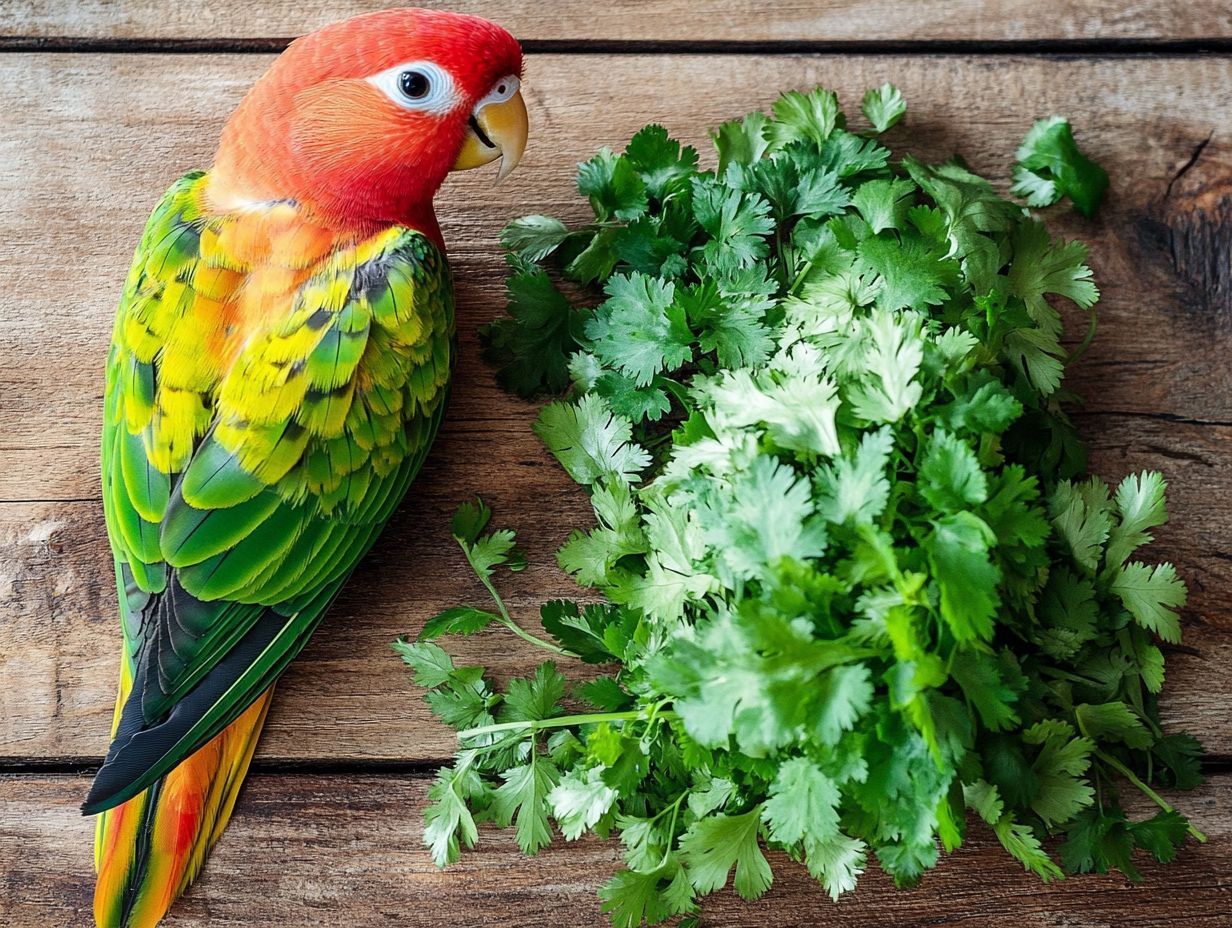
What are the best herbs for pet birds?
The best herbs for pet birds include parsley, dill, cilantro, basil, thyme, and oregano. Additionally, you can introduce chickweed and turmeric as beneficial options. For more information, check out what are safe plants for pet birds.
Why are these herbs considered the best for pet birds?
These herbs are safe for pet birds. They offer health benefits and are easy to grow on your window sill.
How can herbs benefit my pet bird?
Herbs provide essential nutrients and support digestion. They also boost the immune system and promote overall well-being.
Can I offer my pet bird fresh or dried herbs?
Both fresh and dried herbs work well for birds. However, fresh herbs usually offer more nutrition.
Always wash fresh herbs before giving them to your bird. You can also add cooking herbs for extra flavor!
How often should I offer herbs to my pet bird?
Offer herbs a few times a week as a treat. Remember, herbs should not be the main part of your bird’s diet.
Are there any herbs that are harmful to pet birds?
Some herbs, like chives, garlic, and onion, can be toxic. Always consult a vet before adding new herbs to your bird’s diet.

